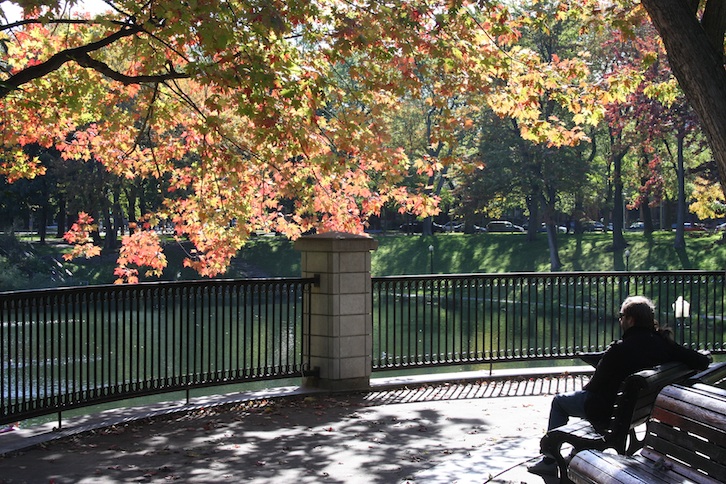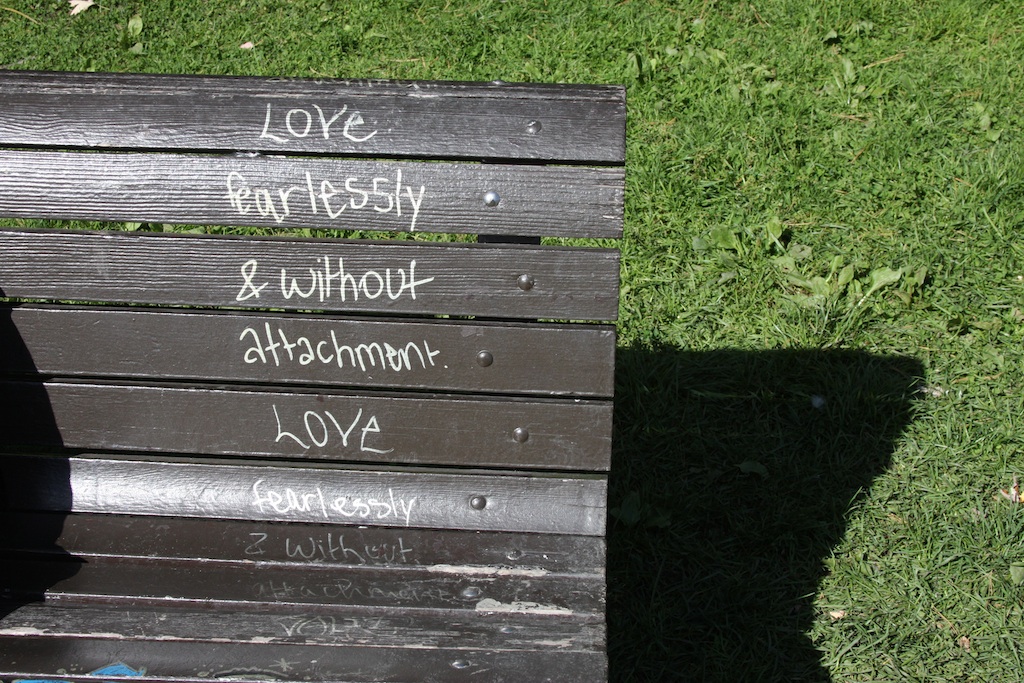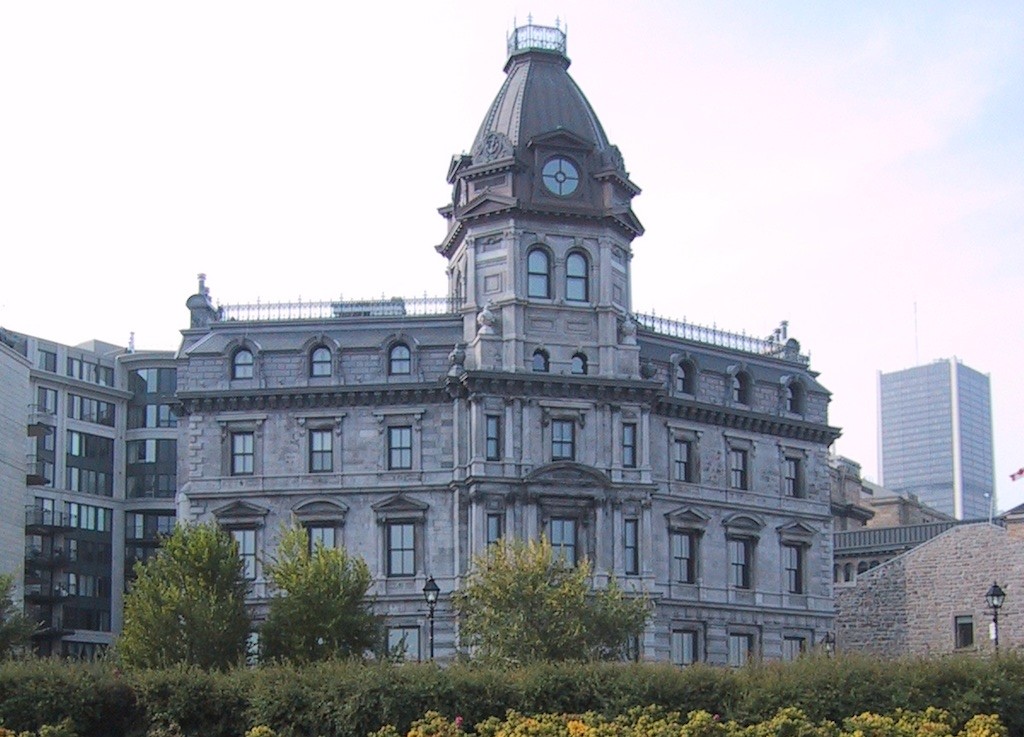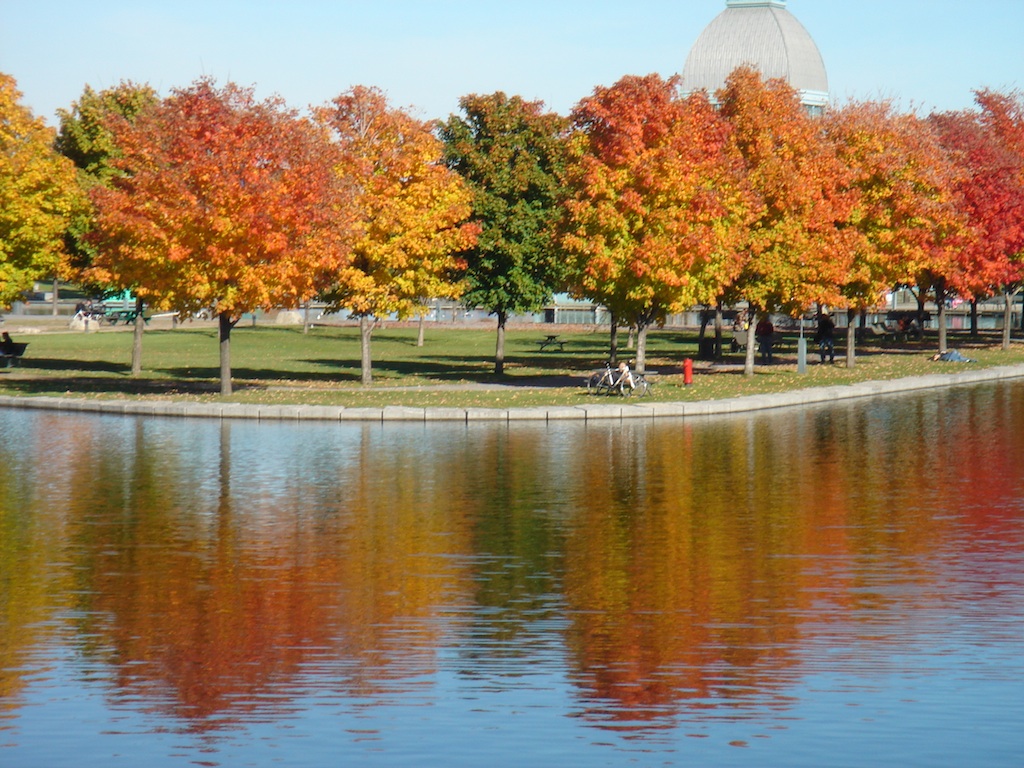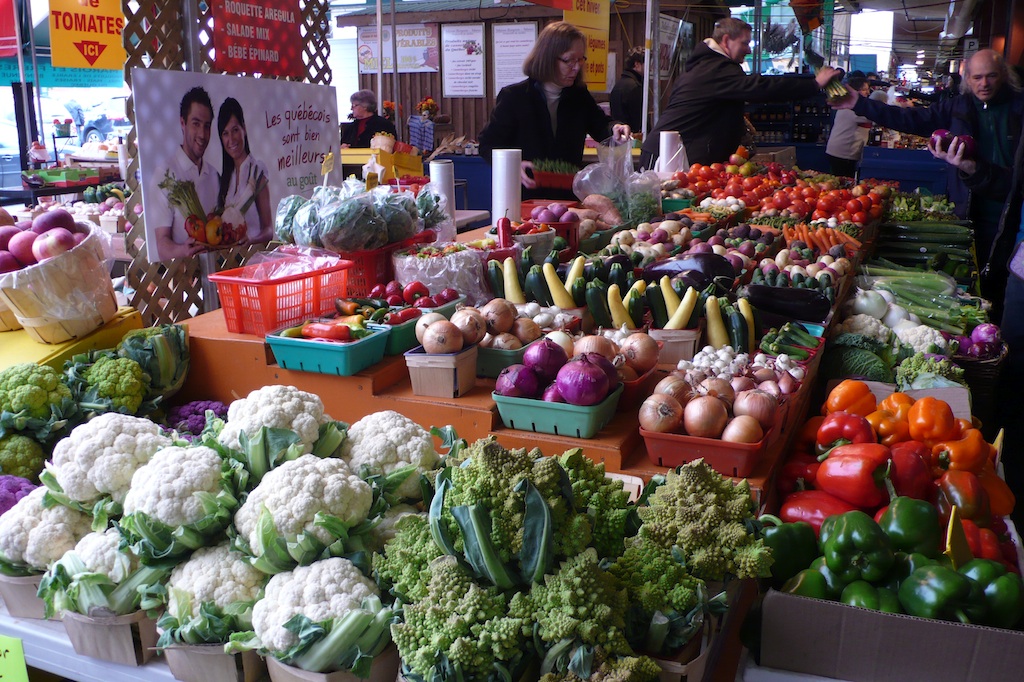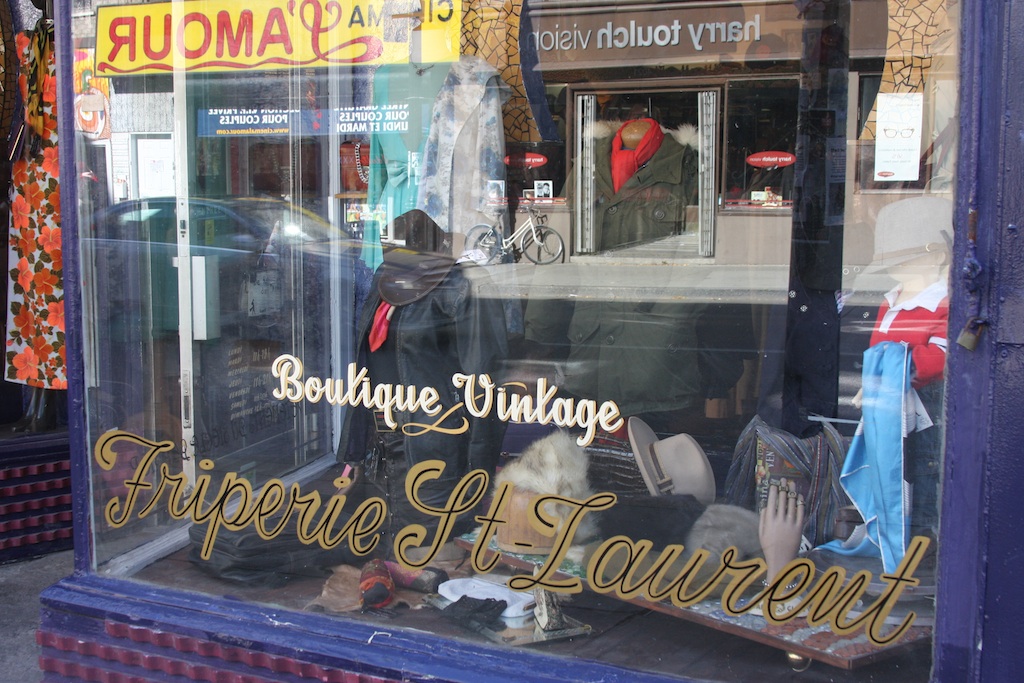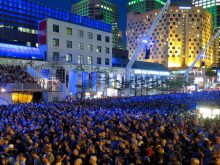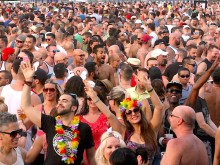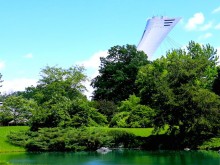For those of us living in large American cities where winning is paramount and money the raison d’être (and the scream of sirens ongoing…), there is a great deal of comfort to be found in a city where civility is celebrated. Few cities in North America are more civil than Montreal – and particularly to LGBT people.
During the past decade, Montreal has earned a reputation (and numerous nominations and awards) as one of the world’s best LGBT destinations – and after spending time in Canada’s second-largest city, it’s easy to understand why (and, trust us, it’s not only because Montreal’s original name was Ville-Marie or “City of Mary”).
In 2005, Canada was one of the first countries to offer full legal rights of marriage to LGBT people – while way back in 1967, it was Pierre Trudeau, the Minister of Justice, who astutely remarked, “There’s no place for the state in the bedrooms of the nation.” Contrast that statement with the 1986 US Supreme Court decision in Bowers vs. Hardwick which stated otherwise – and you have a better understanding of why Canada, and Montreal, have a history of social progress that puts the US to shame.
Recently designated a UNESCO City of Design, Montreal received the award for its citywide emphasis on talent, tolerance, diversity, and technology – all factors that enable a plurality of values and overall inclusiveness of its citizenry. The 2006 honor takes on even more resonance when you realize that Berlin and Buenos Aires are the only other recipients of UNESCO’s Creative Cities Network award.
The “Paris of North America”
As the second-largest French-speaking city in the world (after Paris), Montreal has often been considered the “Paris of North America” – but there’s more to that appellation than language. Montreal’s other moniker is “Canada’s cultural capital,” which is a testament to the city’s unequivocal support for the arts and design – and particularly music.
Montreal locals often remark that there are two seasons in their city: winter and festivals. Every year, Montreal hosts more than forty festivals (nearly one a week), from the Jazz Festival (the world’s largest jazz fest, according to Guinness), which happens at the end of June, to the Just for Laughs Festival, Montreal’s largest festival – and the largest comedy festival in the world.
And while there are specifically LGBT festivals running throughout the year, such as BBCM’s Black and Blue Festival during Canadian Thanksgiving (American Columbus Day weekend), and Divers/Cite during the last week of July, as well as the Montreal LGBT Pride Festival in August, there are also festivals that draw nearly as many LGBT people as heterosexuals, such as Bal en Blanc in April, and Igloofest in January.
The point is, Montreal’s population is so openly supportive and inclusive that LGBT people are nearly always a factor at every one of Montreal’s forty festivals throughout the year.
“Le Village”
Montreal has its own Gay Village, known locally as “Le Village” and readily identifiable by the rainbow pillars at the entrance to the Beaudry Metro station. With historical roots that go back to a gay cake shop on St. Antoine Street in 1869, the Village is centered on St. Catherine Street – and at more than a mile long, it is one of the largest areas of LGBT businesses in North America.
Like a phoenix rising from governmental repression during the nearly thirty-year regime of Mayor Jean Drapeau (who established the Public Morality Committee), the Village expanded exponentially during the Eighties. Originally called “East Village,” because of its location along the eastern swath of St. Catherine, the Village is the hub of all things gay, from clubs, bars, and discos, to restaurants, saunas, bed-and-breakfasts, and boutiques. During the summer, St. Catherine Street is closed off to vehicular traffic – and, instead of cars, pedestrians and pergolas command the street, making St. Catherine Street a Canadian manifestation of the Piazza Navona in Roma.
While many people celebrate Montreal as the birthplace of Cirque du Soleil (and with good reason: few other circuses have tapped so deeply into an audience’s inner desires and sublimated dreams), the largest bilingual city in North America has its own symphony, opera, and ballet – all of which are about to receive a new cultural campus, not unlike Lincoln Center in New York (which Montreal’s performing arts center resembles in both layout and construction materials).
Place des Arts, right next door to the Gay Village, is currently a massive renovation project, with work on a concert hall for the Montreal Symphony Orchestra scheduled for completion in 2011 – at which point, the Quartier des Spectacles will be a mecca for art and culture mavens, anchored by the Museum of Contemporary Art of Montreal (built in 1992) and the new 1,900 capacity hall.
A French Kiss From the Locals
Apart from the festivals, and the nightlife, Montreal offers a truly global smorgasbord of world cuisine, thanks to the rich, ethnic diversity of its citizenry. Italian is the third most-spoken language in the city, so you might expect a vast array of trattorias and enotecas, but the city is also well-known for its smoked meats and bagels, as well as – yes, we know you’ve heard about it – poutine (more on that later), and another popular Montreal fast-food dish called shish taouk, which is Montreal-style chicken shawarma in a pita wrap with aioli.
With nearly 60% of Montreal’s population speaking French as a first language (followed by English at less than 20%), a trip to Montreal is an excellent excuse to brush up your French. Best of all, Montreal natives are some of the friendliest, most charming people on the planet. Watch what happens when you speak their language: the sweet smile as they work to discern the meaning behind your broken French – then the arm around your shoulder as they take you under their wing. Everywhere you go, everyone you meet, from porters to taxi drivers, from waiters to bartenders (and yes, go-go dancers on St. Catherine) – Montrealers appear to be genuinely happy that you’re in their midst, in a city that they love – and want you to love equally.
Finally, it’s fitting that the Montreal Tourism logo, which visitors see all over Montreal, replaces the O in Montreal with a red-lipsticked kiss – in other words, a French kiss from the locals.
Go ahead, learn the language of Montreal: it’s the language of love. Total immersion language courses available with every local encounter.
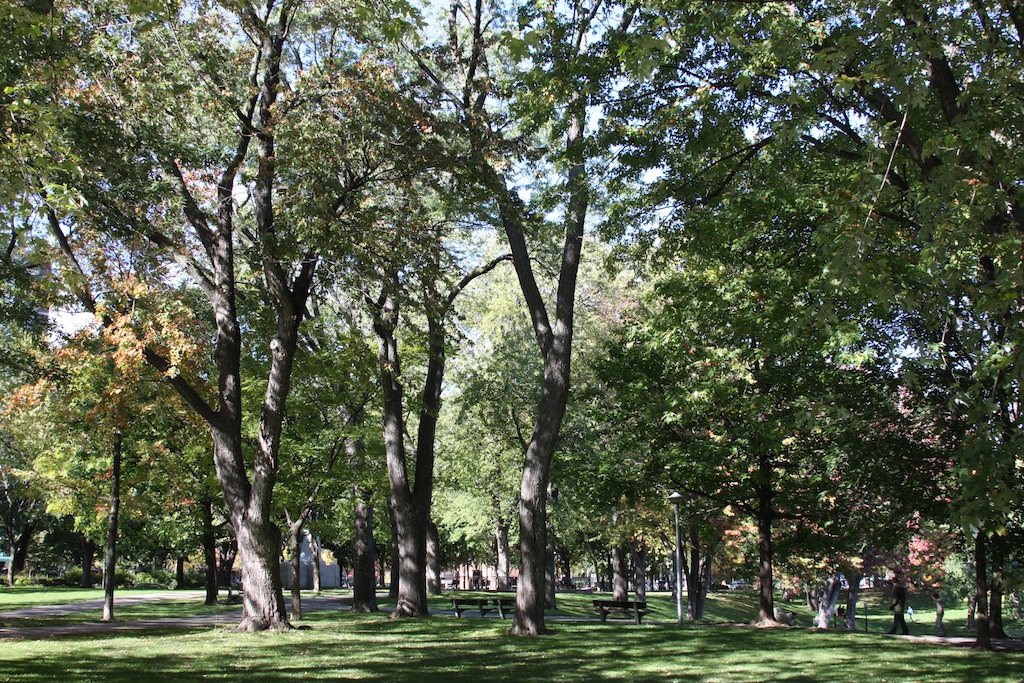
Located in the Plateau district, Parc Lafontaine features a fountain, bike paths, and waterfalls. (Source: MRNY)
MONTREAL SIGHTS:
Parc Lafontaine: Located in the Plateau district, this nearly one-hundred-acre urban park features a fountain, bike paths, and waterfalls, along with an open-air theatre not unlike the Delacorte in Central Park. Best of all, one of the more pleasant ways to enter Parc Lafontaine (named for the first Canadian to be named Prime Minister of Canada) is along Duluth Avenue, a polyglot, cobblestoned street lined with bohemian ethnic restaurants, lounges, bars, and boutiques. One of the more colorful streets in the city, Duluth Avenue is a window into your life should you uproot and move to Montreal.
LINK: http://www.montreal.com/parks/lafontaine.html
Lachine Canal: One of the joys of Montreal is their embrace of the public bike-rental system that enables you to rent a bicycle at one locale – and return it to another. Start your bike journey at the Atwater Market (see below) – and bike along the somewhat industrial Lachine Canal (named for the route to China that early European explorers dreamed of finding) and into Old Montreal. An environmental reclamation project, initiated in 2002, has resulted in residential and commercial development along the canal – and in the autumn, when the leaves are gold and red, there are few bike paths as beautiful.
LINK: http://montreal.bixi.com/home http://www.tourisme-montreal.org/What-To-Do/Activities/lachine-canal-national-historic-site-of-canada
Atwater Market: Take the Metro to Lionel-Groulx and walk towards the massive Art Deco structure near the river with the sign ATWATER. If it’s still autumn, you’ll see piles of pumpkins. If it’s the Yuletide season, look for the Christmas trees. Outside are farmers’ market stalls, while inside are two floors of indoor shops, which are open all year. A cornucopia of Canada’s best produce and ethnic food, the Atwater Market is where you fuel up for your three-mile bicycle ride (or snowshoe hike) along the Lachine Canal, as you head back to Old Montreal. Metro: Lionel-Groulx
LINK: http://www.marche-atwater.com/
Mount Royal: No trip to Montreal is complete without climbing Mount Royal, the triple-peaked hill in the heart of the city where you secure a vista over the entire city, all the way down to the St. Lawrence River. Start your walk through McGill University and then meander north along the footpaths, heading up the stairs until you reach the Kondiaronk Belvedere, which affords some of the best vistas of the city unfolding below you. At this point, you might think about Jacques Cartier, who was the first European to scale the mountain in 1535, and who named it Mount Royal, in honor of his patron, the King of France. Later, on your walk back down the hill, consider Mayor Drapeau, from the Fifties, who deforested much of the mountain in order to prevent people from having public sex. Fortunately, the trees (and sex) have returned. Metro: Mont-Royal
LINK: http://www.montreal.com/parks/mtroyal.html
Montreal Botanical Gardens: This year’s 18th edition of the Magic of Lanterns marks the 25th anniversary of the friendship between Shanghai and Montreal with an evening lantern festival inspired by the most famous traditional Chinese painting, which depicts a city on the eve of an important festival. A tradition that dates back to 206 B.C., the Magic of Lanterns features more than 700 traditional lanterns, as well as lanterns in the shapes of grasshoppers, dragonflies, and butterflies. Through 31 October 2010. Metro: Pie-IX
LINK: http://www2.ville.montreal.qc.ca/jardin/en/menu.htm
CULTURE:
Montreal Museum of Fine Arts: Rouge Cabaret: The Terrifying and Beautiful World of Otto Dix: Any artist that the Nazis regarded as degenerate is someone that every LGBT person should be familiar with – and, at long last, Otto Dix, the Weimar artist whose brutally realistic depictions of Germans between the wars cost him his job (as well as the destruction of many of his paintings) has been given his first North American retrospective. One of Dix’s most famous paintings is the triptych Metropolis (1928), his commentary on the endless hedonism that gripped Germany after World War I. Non-stop partying was one way to deal with financial collapse – which should give all Americans pause. Housed at the Musee des Beaux Arts, an iconic structure just west of the Ritz-Carlton on Sherbrooke, the Otto Dix retrospective could not be more timely. Montreal Museum of Fine Arts, 1380 Sherbrooke Street West, through 2 January, 2011.
LINK: http://www.mbam.qc.ca/en/index.html
Denis Gagnon Shows All: on the tail of a recent exhibition devoted to the work of Yves Saint Laurent, and just prior to one on Jean Paul Gaultier, comes a retrospective of Denis Gagnon’s influential fashion work, which marks the first time that a couturier from Quebec will be the subject of an exhibition at MMFA. Montreal Museum of Fine Arts, 1380 Sherbrooke Street West, through 13 February, 2011 .
LINK: http://www.mbam.qc.ca/en/index.html
Montreal LGBT Film Festival: Image & Nation: slur the words together and you get – imagination. That’s right – and that’s the name of Montreal’s LGBT film festival, which runs from the 28th October through the 7th of November, featuring over 100 LGBT films. 28 October – 7 November 2010 .
LINK: http://www.image-nation.org/corporatif/index-eng.php
BBCM Events: Ever since 1991, when a few prominent gay Montreal activists and party boys got together and threw a fund-raising party to combat the toll of AIDS, BBCM (Bad Boy Club Montreal) has been one of the more prominent producers of all-night revels and bacchanals in a town globally known for parties. Black and Blue recently celebrated its twentieth anniversary, but the rest of the year is filled with BBCM events, which are celebrated for seamless productions, exemplary sound, and a surfeit of beautiful boys. BBCM Calendar 2010-2011: Bal des Boys, 30 December 2010 – 2 January 2011 Red, 10-14 February 2011 Hot and Dry, 19-22 May 2011 Twist, 9-14 August 2011 Black and Blue 21 / “Black Jack,” 5-11 October 2011.
LINK: http://www.bbcm.org/home-en/
Igloofest: Organizied by the boys behind Piknic Electronik, Igloofest is Montreal’s winter rave – outdoors in Old Montreal. Back for its fifth edition, Igloofest attracts thousands of music fans over the last three weekends of January for a dance marathon on a floor of snow and slush with some of the world’s most popular deejays. 13 -29 January 2011 .
LINK: http://www.igloofest.ca/?en/ – /home_en
Bal en Blanc: Montreal’s White Party Week returns for its 17th edition at Palais des Congres. Expect a full house on Easter Sunday, with approximately 15,000 celebrants. 21 April – 25 April 2011.
Divers/Cite: For the past eighteen years, during the final week of July, Divers/Cite has turned Montreal into a weeklong block party that has become the largest free outdoor celebration in all of North America. From 1993-2006, Divers/Cite was Montreal’s LGBT Pride celebration – and has since become one of Montreal’s gayest arts and music festivals attracting party people from all over the globe for what is now called La Fete Gaie de Montreal. It doesn’t get gayer – and especially at Saturday evening’s Mascara, the Night of the Drags. 24-31 July 2011.
LINK: http://www.diverscite.org/2010/anglais/index.htm
WHERE TO STAY:
Opus Hotel: Partially housed in an historic 1914 Art Nouveau building (the first poured concrete edifice in North America), the Opus Hotel Montreal’s other half features a completely contemporary concrete addition designed by Dan Hanganu and award-winning interior designer, Yabu Pushelberg – making for a fascinating interplay between classic and modern, a dynamic which perfectly mirrors the Montreal aesthetic.
Located on the corner of Sherbrooke and St. Laurent (mere blocks from Holt Renfrew (the Bergdorf’s of Montreal), as well as the Musee des Beaux Arts), the Opus is strategically situated at the crossroads of several neighborhoods: minutes from Old Montréal, the Gay Village, and the Plateau Mont-Royal.
With 136 guest rooms furnished in dark woods and resplendent fabrics such as velvet and silk (and toiletries by L’Occitane), the Opus is an amalgam of boutique experience and Ancien Regime. The sister hotel to the Opus Hotel Vancouver, which was one of Conde Nast’s Traveler magazine’s Hot 100 Hotels, the Opus Hotel Montreal serves an urbane and cosmopolitan clientele with a mixture of panache and casual chic. The sumptuous rooms provide ample space for the accumulation of shopping bags from St. Laurent’s numerous second-hand stores, designer boutiques, and eclectic shops. As for the staff, in keeping with Montreal’s reputation for civility, they are as gracious as they are helpful – and a reminder that politeness aligns perfectly with kindness.
LINK: http://www.opushotel.com/montreal/english/index.html
Hotel Gault: A bastion of almost ascetic minimalism, the Gault is a shrine for those who can’t abide clutter – anywhere. Sleek and chic, the Gault is not to everyone’s taste (we have friends who find it cold) – and yet, the Gault was also the winner of TripAdvisor’s Travelers’ Choice Award in 2009.
One of our favorite hotels in the world, the Gault has thirty loft-style rooms, which enable residents to feel as if they’ve landed inside an issue of Architectural Digest (let’s face it – a wet dream for certain gay men…) Both contemporary and comfortable, the Gault is located right off McGill Street in Old Montreal, with a stylish corner restaurant – and one of the more polished and accommodating hotel staffs in Montreal.
LINK: http://www.hotelgault.com/index_en.cfm
The Nelligan: Housed in a stunning, stone building on St. Paul West, in Old Montreal, the Nelligan feels like a European hotel in some historic capital, which is partially attributable to its location along the cobblestoned horse and buggy route. Clip clop, clip clop – it’s the nineteenth century.
More than half of the Nelligan’s capacious rooms have fireplaces, making the Nelligan a perfect setting for a romantic getaway – and the in-house restaurant, Verses, serves contemporary French cuisine amidst stone and brick walls and curved red banquettes.
The Nelligan oozes romance, and on our last visit, a wedding reception was held in the lobby and restaurant – and there’s nothing more romantic than two grooms (or two brides) bubbling with happiness.
LINK: http://www.hotelnelligan.com/index_en.php
WHERE TO EAT:
Montreal is a gastronomic smorgasbord – and while poutine, that post-midnight mass of frites, cheese curds, and gravy, has become something of a city trademark, there’s more to Montreal eats than fatty foods. A true epicure’s destination, Montreal offers a plethora of the world’s cuisines.
Aux Vivres: Arguably, the most popular vegan restaurant in Montreal, this is a mecca for everyone who loves to eat. Originally opened in 1997, Aux Vivres’ newish locale on Montreal’s Main (St. Laurent) is filled with blond wood and white Formica tables. On weekends, Aux Vivres teems with life, as the two-room restaurant fills with people happily eating some of the freshest food available in Quebec. Think you’re not a vegan? Try the BLT, which gets its bacon flavor from smoked coconut, served in homemade chapati – and you might never want to eat a dead pig again.
LINK: http://www.auxvivres.com/en/home/
Cafe Melies: Named for Georges Melies, one of France’s first filmmakers, this chic eatery/lounge is an homage to the silver screen with sleek design elements harking to the history of motion pictures. Located in the Ex-Centris Complex, one of Montreal’s digital and post-production studios, Cafe Melies opened in the spring of 2002 as an extension of a popular cafe – and since then, the restaurant/lounge has become a popular hub for those seeking fine dining complemented by a stylish crowd of film aficionados. A mélange of Philippe Starck furnishings and film festival foodies. Don’t miss the pineapple upside down tarte with burned caramel sauce.
LINK: http://www.cafemelies.com/main_en.html
Commensal: One of seven vegetarian restaurants located throughout Canada, Commensal offers a self-serve, buffet experience, roughly the equivalent of an endless brunch – albeit with entirely vegetarian and vegan options, including a vast array of hot and cold options, as well as scrumptious desserts. Since 1977, Commensal has been feeding omnivores, as well as herbivores – because their vegetarian recipes are nearly impossible to resist. Commensal’s commitment to their patrons’ (and the planet’s) health have earned the restaurant a nomination for the Phenix de l’environnement Award 2010. Want to feel good after eating? Eat here. As Commensal’s motto has it: “Taste Life.”
LINK: http://www.commensal.com/en/default.idigit
Frites Alors: Ever since 1991, when the first Frites Alors opened on Montreal’s Park Avenue, these Belgian-style bistros have been the place to go post-clubbing, post-alcohol buzz – when you’re desirous of soaking up the sauce with calories and fat. Operated by Cholesterol Plus Inc, Frites Alors has expanded to nine bistros all over town. Comprised primarily of students and artists, the staff is young (and hot) and the open kitchen and bar-counter make it easy to make friends at this late hour. Reasonable prices and a cool vibe make Frites Alors a fitting reflection of some of Montreal’s best attributes.
LINK: http://www.fritealors.com/en/indexb_a.html
Olive + Gourmando: Walking around Old Montreal is addictive, although it’s sometimes difficult to discern where best to eat. Search for the cluster of people hanging outside this corner restaurant on St. Paul West: there’s a reason they’re waiting for a space inside. Some of the best sandwiches in Montreal are served here, as well as some of the more delicious winter soups. Oh, yeah, and baked goods too, as well as delicious coffee. The vibe is cool – and everyone who’s anyone in Montreal stops here sooner or later. It’s a melting pot of the best of Montreal: a hip and happening place with no attitude, because everyone’s happy to be eating here, whiling away the afternoon in Old Montreal.
LINK: http://www.oliveetgourmando.com/index_flash.cfm
WHERE TO SHOP:
Priape: As a gay person, no visit to Montreal is complete without a stop here. Named for the Greek god of tumescence, Priapus, and located in the heart of the Village, Priape has been in business since 1974 serving a discerning clientele all the proper leather accoutrements, as well as the latest underwear du jour. Party tickets are purchased here; so are magazines for late nights. The atmosphere within is akin to a house party, with music blasting and boys shimmying into tight briefs and brief boxers – and on some nights, Priape is where the party commences.
LINK: http://www.priape.com/default.asp
Holt Renfrew: It’s Montreal’s equivalent to Bergdorf’s – and it’s loads of fun to wander, particularly when there’s a sale. Warning: a sale at Holt doesn’t mean the merch is affordable, but it’s all still cutting-edge and inspiring – and lovely to the touch. If your credit card is maxed out, relax: there’s still Cafe Holt, which is nearly as chic as the clothing.
LINK: http://www.holtrenfrew.com/holts/en/home/
GETTING THERE:
Air Canada: Less than an hour in the air from New York, the flight to Montreal is one of those stress-free trips that restores your faith in aviation. Prices vary according to season, but winter is cheaper than summer.
LINK: http://www.aircanada.com/en/home.html
Amtrak: While the train can take as long as ten hours from New York to Montreal, we’ve heard that it’s quite a beautiful journey, particularly when viewed from the observation car. The Adirondack train travels daily from New York through the Hudson Valley to Albany and on through the Adirondack Mountains into Canada. Rates vary, but the train is cheaper than a plane – and sometimes as little as $62 one-way.
LINK: http://www.amtrak.com/
ADDITIONAL INFO: Click here for MRNY slideshow of Montreal

